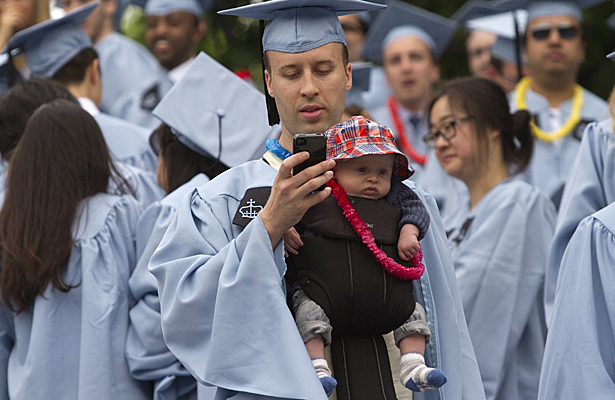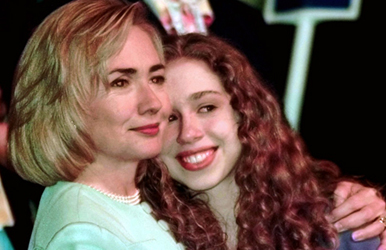Don't Rule Out Having Children Because You Want to Have a Career
New research suggests more and more high-achieving young people are planning to forgo kids in order to pursue careers—perhaps because the joyful parts of raising kids are often overlooked.

In 2012, new graduates of the University of Pennsylvania's Wharton undergraduate program were found to be "significantly less likely to expect to have children" than Wharton graduates were 20 years before. The number of men and women who answered "yes" to the question "Do you expect to have children" fell by half.
To the extent that that means 22-year-old men and women are beginning to see work and family as mutually exclusive, we have a big problem.
The Wharton Work/Life Integration Project, directed by Professor Stewart Friedman, conducts longitudinal research on the evolving interests of Wharton students and alumni. In 1992, researchers interviewed 460 members of the graduating undergraduate class, asking questions about how they thought their work and family life would intersect. Twenty years later, researchers interviewed 314 members of the graduating undergraduate class and asked the same questions. The preliminary results offer fascinating, if somewhat depressing, insights in to the evolution of work and family over two decades.
In 1992, 79 percent of men and 78 percent of women said yes, they expected to have children. In 2012, 42 percent of both men and women said yes. Perhaps they moved into the "probably" category? Not so. That category saw only small shifts for men and women. The big deltas were in the categories of "neutral," "probably not," and "no." Seven percent of women and 12 percent of men answered definitively no in 2012, versus only 2 percent of women and 4 percent of men in 1992. Even more strikingly, 20 percent of women and 18 percent of men said "probably not," up from only 1 percent of the women and 2 percent of the men in 1992. Finally, 17 percent of the women and 16 percent of the men had "neutral" expectations about having children, up from 6 percent and 7 percent respectively.
The change in these numbers does not appear to be motivated by views on the desirability of children, per se. Rather, as the study concludes, over the past 20 years "Women are more likely to see the demands of family life interfering with achieving career success, and this gender gap has grown over the past two decades." It is hardly surprising that the survey participants are planning business careers; that is why they choes the Wharton School. But it is a sad statement, 50 years after Betty Friedan wrote The Feminine Mystique and launched second wave feminism, that 64 percent of women in the 2012 class agreed or strongly agreed with the statement, "The demands of family life will interfere with achieving success in my career," versus only 26 percent of the men. Interesting—and perhaps suggestive—that the percentage of men who agreed or strongly agreed that the demands of family life would interfere with their careers (26 percent) was very close to the percentage of men (30 percent) who said that they either would not or probably would not have children.
The Wharton study contains lots of additional data with regard to how men and women think about two-career relationships and the expectation of "having it all," which the survey defines as "a rewarding career, satisfying family relationships, and a fulfilling personal life." But I want to focus on the idea that 22-year-olds are prepared to resolve the work-family tension by simply giving up on family.
In an essay published in November on the New York Times "Your Money" site, Nadia Taha explained that she and her husband, both in their late twenties with good jobs, were leaning toward not having children for financial reasons. She estimated that having a child and doing everything she could to give him or her the best possible start in life would cost roughly $1.7 million in today's dollars—an expense she felt she couldn't afford. She recognized the many reasons to have children, of course, but worried about her long-term financial security and the pain of not being able to afford "the very best of everything for your child."
Part of the financial calculation, as Taha spells out, is "the often significant loss of income from becoming a mother, even if she continues working full time." In a nutshell, then, because work and family often don't work together, it is just as rational to make the trade-off in favor of work as in favor of family. Lest this line of argument seem idiosyncratic, look at Europe. In countries like France and Scandinavia, where governments bend over backwards to make it as easy as possible to have both careers and families, with generous leaves, affordable daycare, and financial incentives, the birthrate has been moving back upward. In countries where governments make it difficult, the birthrates are falling precipitously.
Something very important is getting lost here. In the first place, I might have been able to make these sorts of calculations at 22 or even 30, but by 35 I felt very differently. It is impossible to predict your future self. And it is not only the biological clock that changes things: As we age, our assessment of the relative value of material success and career advancement versus the simpler joys of human connection often shifts.
Above all, it is impossible on a spreadsheet or in response to a survey to factor in the sheer delight, pleasure, and wonder that child-rearing often affords. Allison Stevens of the Washington Post put it best, in a post responding to my Atlantic article Why Women Still Can't Have It All. I wrote that I did not just feel that I needed to be home with our teenagers, but that I wanted to be; I did not want to miss the last 5 years they would still be at home. Stevens commented on the absence of that view from much of feminist literature. "In Betty Friedan's world," she wrote, "traditional motherhood is all about boredom and vacuuming and being a 'putter on of pants.' In many ways, [Friedan is] right on. But she's also way off: in my experience, child care has been all of that (minus the vacuuming—wink, wink), but it's also been laughter, sunshine, swing sets and wonder. Some of the best stuff life has to offer."
The equal-caregiver/fully engaged fathers who have recently launched a magazine for dads titled Kindling Quarterly take the same view. In a New York Times piece on the venture, publisher and editor David Michael Perez observes: "Before I became a dad, everybody was saying how hard it would be." When his son Amon was born, he realized, "nobody told me I'd actually enjoy this."
For months, I have been giving roughly two speeches a week to audiences of women of all ages. Virtually all the younger women are grateful for the conversation, but worried and often downright grim about the prospects of work and family. It's hard—harder than either our government or our employers are willing to recognize and accommodate. That's why we need change. But make no mistake: Having children is the best thing I've ever done, by a mile. The pleasure of helping and watching them grow, of family life (even with its fights and scenes), of the shared bond between my husband and me as parents (even when we disagree), and of the depth of love it is possible to feel for other human beings... I wouldn't trade it for the world.
The answer is not to stop having or adopting children. The answer is to put our national obsession with work as the only measure of success and happiness into a saner and healthier perspective. Believe it or not, we will actually be better and happier workers if we are allowed to be better parents. We might even rediscover our capacity for fun.
